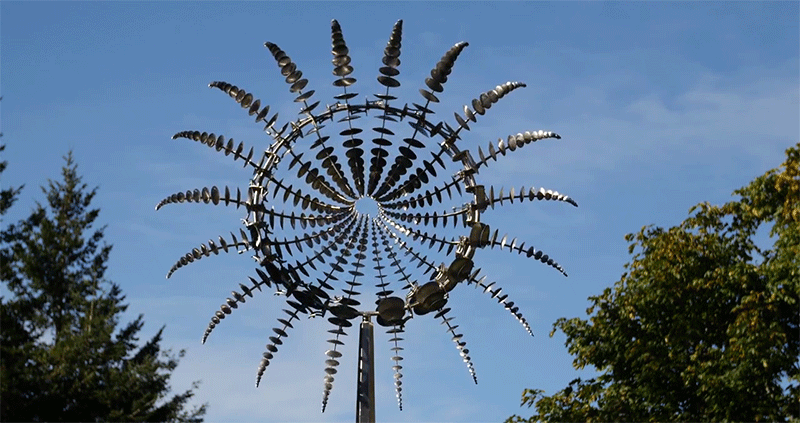
The above amazing object seems not real, it look like a Space Creature. When sees this, someone may got stunning.
It is crested by Anthony Howe, he creates the world’s most mesmerizing kinetic sculptures. His wind-powered, curved-metal designs tower up to 25 feet high, and are on display in public spaces around the world. So take a break from reality and stare at Howe’s work. It’s awesome.
Anthony Howe just might be the world’s greatest hypnotist.
Howe produces all kinds of interesting shapes, all symmetrically balanced, which seem to glide through the air, turning into an organic and harmonious circular motion. The three-dimensional sculptures are exquisitely balanced to produce fascinating patterns and natural optical illusions which you can watch for hours on end.
Here comes Anthony Howe great work.
Kinetic Sculpture Pioneer
Talking about Kinetic Sculpture, it remind us of one person, his name is Alexander Calder, son and grandson of American academic sculptors, creator of joy in a circus of wire and wood, inventor of the mobile and stable.
The largest retrospective of Alexander Calder’s mobiles, slowly changing on every breath of moving air – which so enchanted Albert Einstein that the scientist stood gazing at one for 45 minute.
“A mobile in motion leaves an invisible wake behind it, or rather, each element leaves an individual wake behind its individual self … In setting them in motion by a touch of the hand, consideration should be had for the direction in which the object is designed to move, and for the inertia of the mass involved. A slow gentle impulse, as though one were moving a barge, is almost infallible. In any case, gentle is the word.”
By the late 1920s, fascinated by the circus, he was wondering why sculptures couldn’t move and balance like acrobats.
The viewer moved around it to see the whole piece: “Calder transformed this, we don’t have to move, the sculpture moves for us.”
At first, it is enough to be with them, watching them turn and dip and rise, performing their slow, balletic orbits. Ignore one of them for a bit and, when you look again, something has changed. You become sensitised to their constant self-adjustments. The weightless, gently animated pleasures of Calder’s mobiles are atavistic: like the pleasure of watching snow flurry around a streetlight, a flock of birds turning in flight, the last few autumn leaves flickering in the wind, constellations hammering the night sky.
It is of how good he could be, and a revelation of how complex and far-reaching his influence still is.
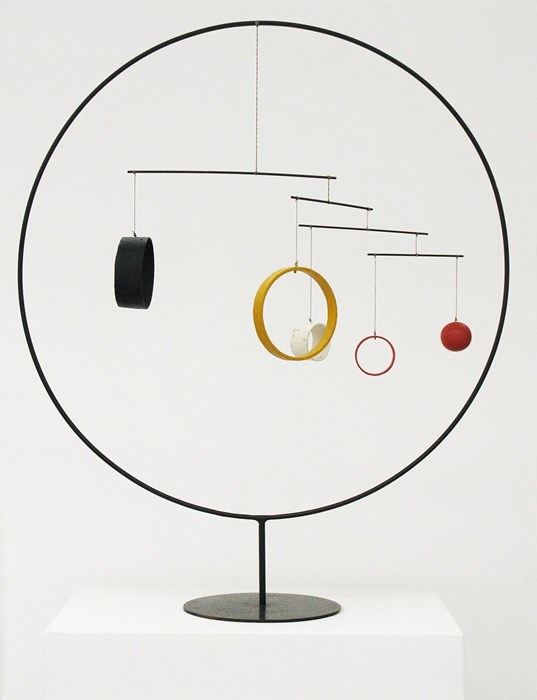
Alexander Calder Great Work
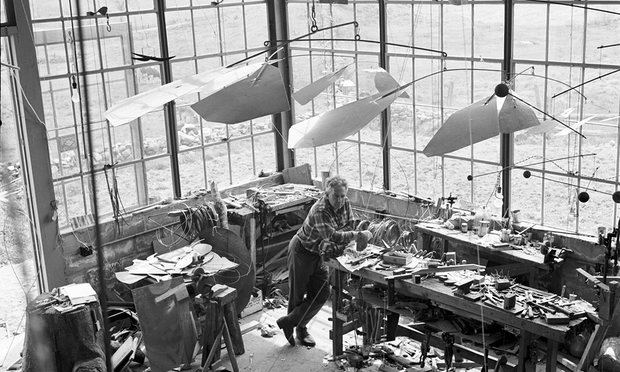
Alexander Calder in his Connecticut studio in 1941. Photograph: Calder Foundation, New York / Art Resource,
Thanks Alexander Calder, Nowdays, the Kinetic has different types.
A Kinetic Sculpture Cafe/Bar
In the Cluj-Napoca, Romania, there is a cafe and bar named Enigma, which is created by Alexandru Tohotan and Zoltan Zelenyak of The 6th Sense Interiors. The impressive design is inspired by the time travelling according to designers.
Its unconventional decor includes a variety of visually interesting features such as an metal gears, machine parts, a gas mask, a gigantic clock and so on. They are all compelling. Parts of the bar are moving at all the times, providing a hypnotizing, theatre-like experience for the guests.
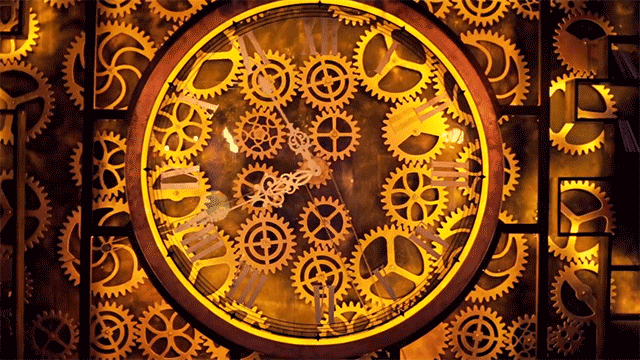
Let us check it by below Video.
ViaYouTube
LED light kinetic show
In the song game, The surprises ORF is holding for the Eurovision audience are endless! Above the arena, 650 hanging LED lighted balls will be created a mesmerising Kinetic Sculpture which will accompany the acts staging.
With the help of technology, 650 LED lighted balls will be running above the arena moving vertically in a span of 5 meters and with speed of 1.5M/second.
ViaYouTube
This type even has been showed in the shop Mall! So compelling.
ViaYouTube
Kinetic Sculpture Car
In the BMW Museum in Munich, these balls were attached to strings from the ceiling and together they created three dimensional shapes including a car.
ViaYouTube
How about 288 analog clock. It is mind-opening.
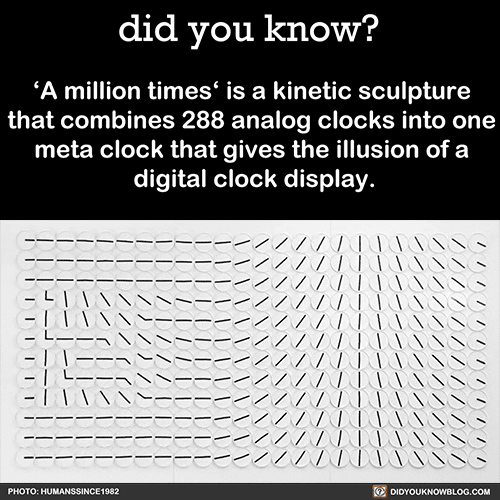
Kinetic Sculpture Lamps
Korean designer U-Ram Choe has created series of award-winning kinetic sculpture lamps that can instantly change any room into an art gallery.
Inspired by the beauty all things natural, these lamps cleverly combine machine and Mother Nature. The giant kinetic sculptures portray a sense of futuristic style that can almost be considered as extra-terrestrial art.
His work has been praised by professionals and art reviewers, admiring the otherworldly beauty that “resemble futuristic weapons” from sci-fi films.
ViaYouTube
Zinna Kinetic Sculpture
Someone makes Kinetic Sculpture by wood, created by Clayton Boyer and it is utterly the most hypnotizing contraption you’ll ever see. Typically, kinetic art is controlled by wind, a motor or the observer and makes for one unique experience.
Helicone
How about the kinetic sculpture below. It is a great gift for the kids.
According to its designer, John Edmark’s Helicone is a kinetic sculpture that amplifies “our awareness of the sometimes tenuous relationship between facts and perception.” Inspired by nature and based on the Fibonacci numbers, Helicone packs some pretty unexpected behavior into what appears to be a fairly simple object. Utilizing 38 pieces of excruciatingly precise laser-cut wood, unique internal mechanisms, and a brass tube, Helicone completely transforms at the twist of your hand.
![]()
Colibri
Derek Hugger’s latest kinetic sculpture, Colibri, mimics a hovering hummingbird. Although the flying movements are unmistakable, the structure has much more in common with a clock than a bird.
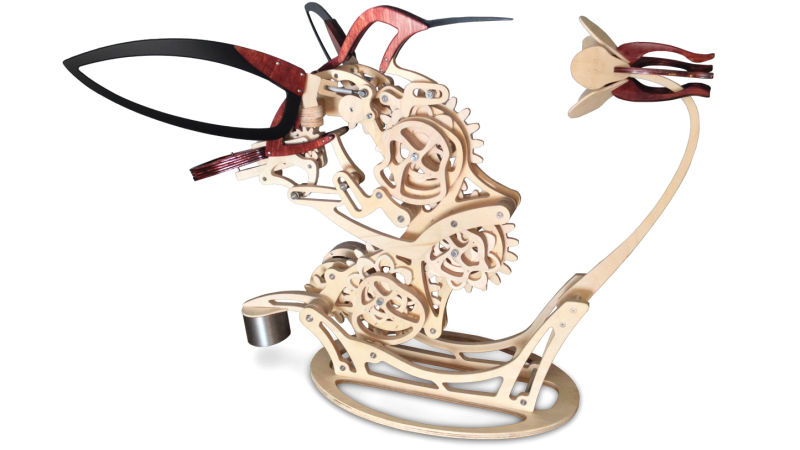
Every movement of the element is completely mechanized, from the wings flapping to the tail flaring. The intricate connection systems, gears and cams brings the sculpture to life with a steady stream of articulations meticulously timed. So each engine is associated with bird movement cycles by the simple turn of a crank. This project took about 700 hours to make.
ViaYouTube
Kinetic Sculpture Make Up of 14,000 Eyeglass Lenses
It is not an easy thing to finish this art. It is witch mirror in the wind.
Kinetic Sculpture ‘Metropolis II’.
Chris Burden’s sculpture at the Los Angeles County Museum of Art, “Metropolis II,” is one giant sensory overload — bright cars whiz past on an oversized Hot Wheels track in a never-ending loop, powered by conveyor belts that create a constant hum of electricity. The whole thing’s so loud and kinetic you can actually feel its energy in the room. And if all that comes from standing outside the sculpture, imagine what it’s like standing inside the bustling “city.”
She says it took a team of eight people “five and a half years…full-time” to build the sculpture, which she characterizes as “a machine.”
Hypnotic Kinetic Mathematics and Art
Although powered by simple rotary engines, these kinetic sculptures by Netherlands-based sculptor Jennifer Townley are dizzying in complexity. Repetitive patterns twist, merge, and cascade as individually sculpted elements rotate on a single axis, an intricate fusion of art and mathematics. From Townley’s artist statement:
The works derive from her fascination with science, with an emphasis on physics, engineering and mathematics. Geometric patterns in Islamic art or mathematical drawings of Dutch artist M. C. Escher often serve as an inspiration. Images where lines and figures match each other so perfectly they could be repeated indefinitely. This infinity, regularity and obedience is what Townley also finds fascinating about mechanical machines; they are robust, strenuous and seemingly immortal. She is captivated by how a machine can convert a simple circular motion (rotary engine) into a very complicated nonlinear or chaotic movement pattern.
Sisyphus Kinetic Sculpture
It’s full of some amazing character models featuring realistic motion, all achieved using mechanical links and gears. Of course inspired to build own version of the Sisyphus model out of LEGO parts.
We now know when those wacky, imaginative, human-powered works of art will reappear.
They are made to give pleasure, GENIUS!